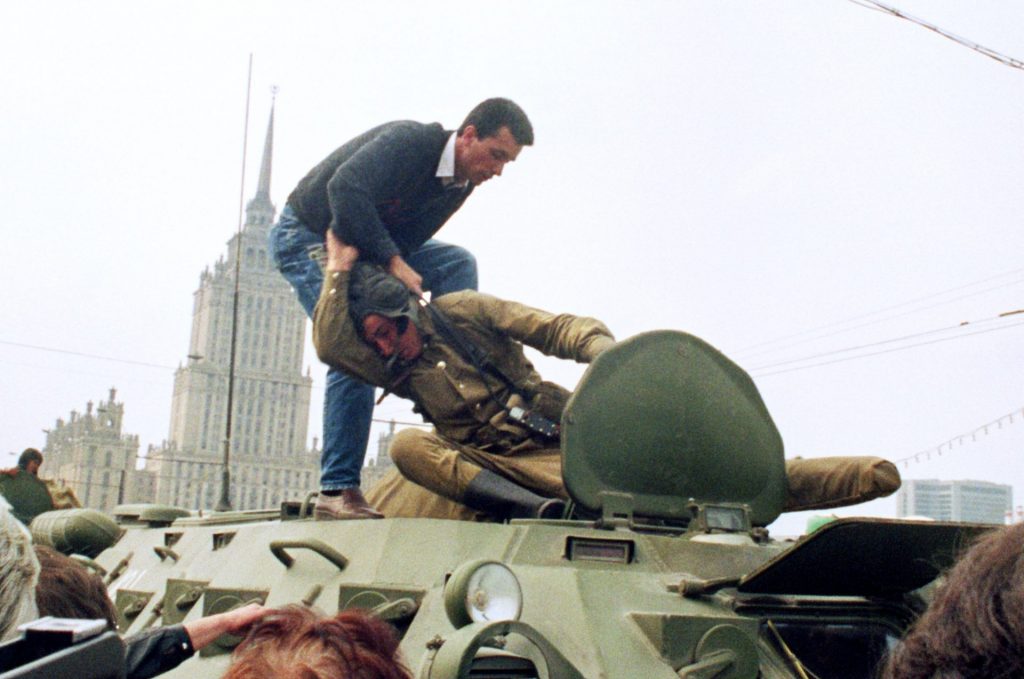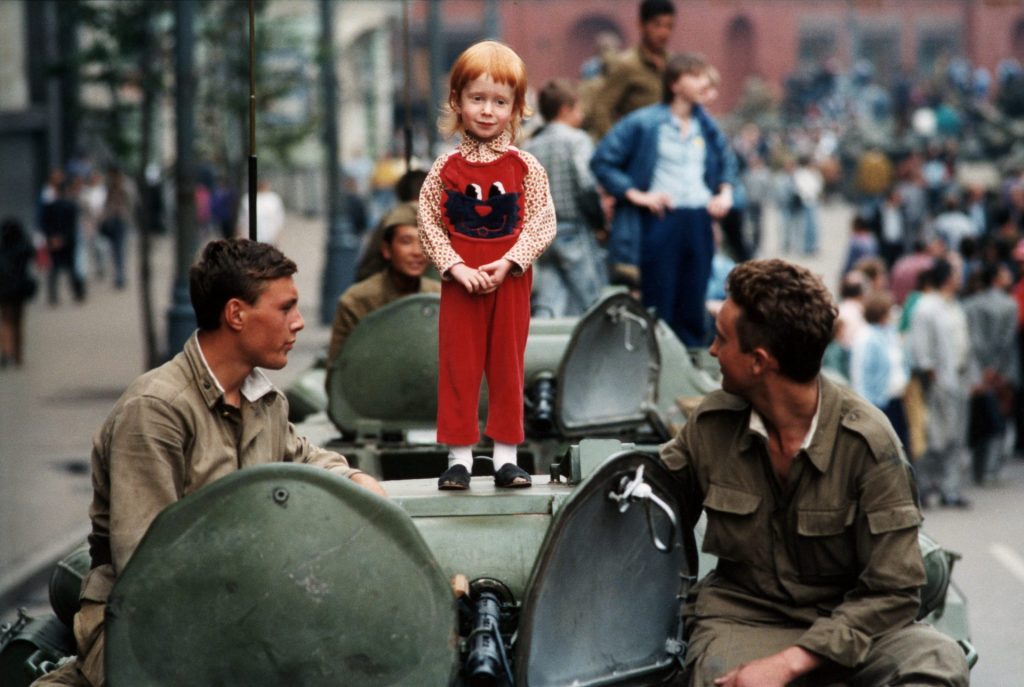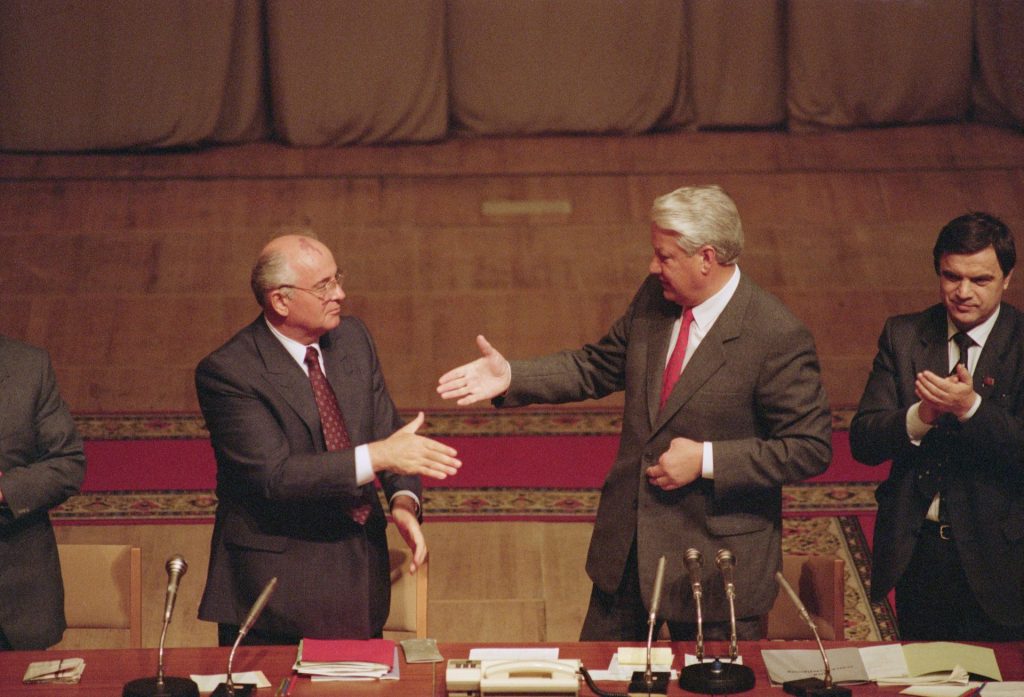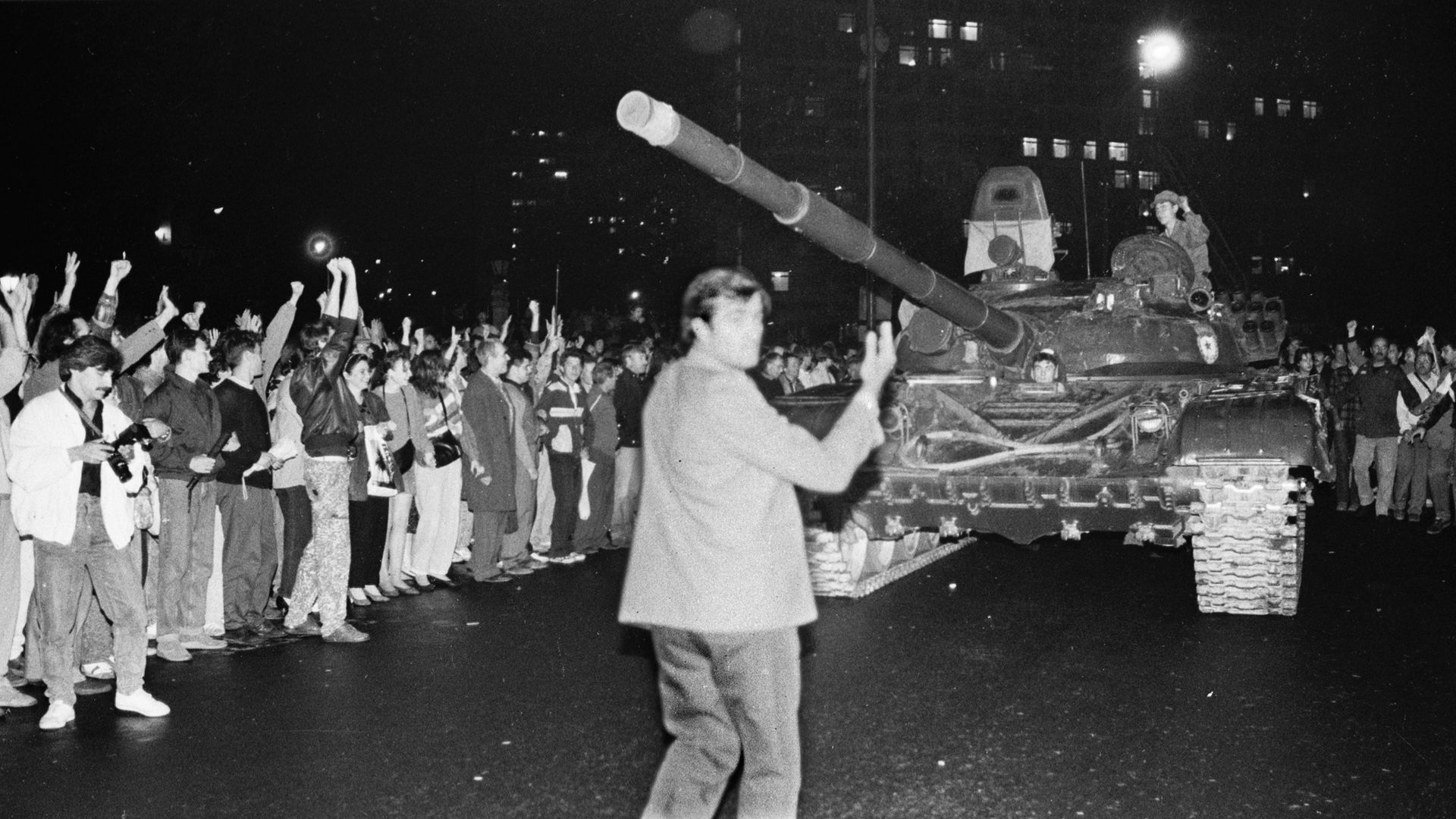“Nothing ever happens in August, bar the odd World War,” I confidently told a worried lord mayor of Cardiff over lunch: he was on his way to Ukraine and feared trouble.
“The Soviet president, Mikhail Gorbachev, faced down some unruly colleagues a few weeks ago. But he’s now gone on holiday, and we’re about to do the same.” After we’d seen the mayor off, my wife Jill and I flew off to visit the ancient wooden churches beyond the northern city of Vologda. It was August 18, 1991.
Next morning we woke in our hotel, the local Communist Party guest house, to hear the BBC announce that an emergency committee – the heads of the Army, the KGB, and the government, the same colleagues that Gorbachev thought he had slapped down – had taken over the Soviet Union because the president had sadly fallen ill. They had confined him to his holiday home in the Crimea for his own good, brought tanks into Moscow to keep the peace, and cracked down on the media. They appealed for calm.

It was their predecessors who in 1964 had ousted Nikita Khrushchev, another unsuccessful reformer. Now the Soviet economy was in free fall, despite Gorbachev’s tinkerings. The Berlin Wall had come down, the former Soviet satellites in Eastern Europe had successfully asserted their independence, and Germany, divided since 1945, had been reunited within NATO.
In March 1989 Gorbachev had organised the first halfway free elections in the Communist bloc. They were accompanied by all the trappings of democracy: vicious intrigue over the selection of candidates, noisy meetings on the streets, vitriol in an unleashed press.
When it came to the voting, many senior Communists were swept from seats they had held for years as of right. A firestorm of criticism of the Party and the government broke out in the new parliament, all shown on television.
Now, even inside the Soviet Union itself, the Balts, the Georgians, and the Ukrainians were demanding their freedom with uncompromising insistence.
No wonder the hard men were unhappy. We’d all recognised that they might seek the Khrushchev solution. But amid the swirl of rumour almost no one foresaw the actual event: neither Gorbachev himself; nor his rival Boris Yeltsin, the charismatic and ambitious president of Russia (still only one of the constituent parts of the Soviet Union); nor president Reagan, nor prime minister Thatcher; nor their intelligence agencies. Most of the few that got it right did so by chance.
Jill and I scrambled back to Moscow. There were tanks on every street corner. Their confused young crews were desperately trying to fend off questions from passers-by asking what on earth they thought they were doing.
The plotters had bungled their plans to arrest Yeltsin. He was now besieged and defiant inside his office, the “Russian White House”, defended by veterans from the Afghan war. Thousands of people were flocking there to support him.
The banned newspapers were putting out illegal pamphlets to keep people informed. A radio station was broadcasting defiantly from a hidden location.
That evening the plotters tried to explain themselves on TV. Their performance was abysmal. Some were drunk. Jill christened it “The Muppet Show”. Though the outcome was not yet clear, the coup already had a smell of defeat about it.
It was late the following night, and Jill was with Russian friends among the defenders on the barricades outside the White House when soldiers opened fire in a confused scuffle nearby. Three young men were killed.
The plotters lacked the guts to settle matters by sending their troops to storm the White House. Next day they threw in the towel and withdrew the tanks. Yeltsin had them arrested.
Gorbachev returned to Moscow grey and worn in the small hours of the morning. That evening he told the nation on television that the conspirators had visited him in Crimea. He had sent them packing with some choice Russian swearwords.

They had confined him in the house and cut off all his communications with the outside world. He and his family had kept track of events thanks to the BBC and a pocket radio. His wife Raisa was in shock. They had feared for their lives. Just in case, he had recorded a final address to the Soviet people. Anatoli Chernayev, Gorbachev’s admirable diplomatic adviser, was there with him: he revealed later that his secretary had hidden the tape in her knickers, on the off-chance that she might be able to smuggle it out.
Gorbachev had always been our favourite. We were moved by his performance in the television interview. But he got the tone quite wrong. The interviewer asked him to distance himself from the Communist Party. He believed it could still be reformed.
He could not explain how he had let himself be betrayed by the very men he had appointed and trusted (conspiracy theorists still argue that he was in league with the plotters all along, an unconvincing attempt to force the facts). We sadly concluded that the way was now open for Yeltsin to take over even more quickly than we had anticipated.
So indeed it proved. Yeltsin squeezed every drop of advantage from his victory and manoeuvred with ruthless determination throughout the autumn. Gorbachev’s authority drained away before our eyes.
And then on the evening of December 6, as we were showing our Russian guests out after dinner, the telex clattered into action. Yeltsin and his opposite numbers from Ukraine and Belarus had met in secret to announce that the Soviet Union was “ceasing its existence as a subject of international law and a geopolitical reality”.
For a man who, like most Russians, believed deeply that Ukraine was an integral part of his country, it was a breathless piece of opportunism. But for the Soviet Union, it was the death blow.
Gorbachev handed over to Yeltsin on December 25. As we ate our Christmas dinner in our embassy across the river from the Kremlin, we watched the Soviet flag flutter down for the last time, and the Russian flag rise to take its place.
For most of us in the West, it was a moment of great hope. We had lived in the shadow of nuclear annihilation. Now that was over.
The threat of Communism had disappeared overnight. Perhaps the world – Russia too – might, at last, become a better place.
But for most Russians, even those who had been glad to see the back of the old regime, it marked what president Putin later called a geopolitical disaster.
A few nights after the coup Gorbachev had called me to the Kremlin. It was dark and eerily quiet, guards every few paces in the shadowy niches of the corridors. I thought of Stalin summoning his terrified subordinates as he worked there into the small hours of the morning.
Gorbachev said he needed to borrow $13 billion to restore the shattered economy. I reminded him of what he already knew: the West would give nothing until he had a convincing plan of reform.
That was perhaps the right answer. But when Yeltsin launched a dramatic and genuine economic reform in January 1992, he too asked for a loan. We told him we couldn’t afford it.
The Russian economy continued to descend into chaos. Unemployment soared. The government had no money to pay its teachers, its doctors, and its soldiers. Factories laid off their workers wholesale.
The social services collapsed, the suicide rate went up, the birth rate went down. Old ladies sold their family treasures on the streets.
Famine loomed for some as others – ingenious Party members, KGB officers, former scientists and intellectuals – exploited disorder to get unimaginably rich. Yeltsin increasingly succumbed to drink and sickness.
In January 1992, president Bush told the world: “By the grace of God, America won the cold war.… A world once divided into two armed camps now recognizes one sole and preeminent power, the United States of America.”
We ignored Russia’s international interests while insisting that they were no different from ours. Western businessmen ruthlessly exploited the opportunities for profit. Overpaid Western consultants lectured the Russians on how to run their affairs, though they too had no idea how to dismantle a continent-wide state economy.
Not surprisingly, Russians found all that deeply offensive. The enlargement of NATO stuck particularly hard in their gullets.
In the early 1990s, Western statesmen assured the Russians that they had no intention of expanding NATO beyond Germany. Then the intentions changed. NATO gave membership to the Balts and to Russia’s former East European satellites.
Russians believed they had been double-crossed. They were shocked by NATO’s bombing of Serbia in 1999 a foretaste, they feared, of what Russia itself might expect.
One intelligent, well-heeled young woman, typical of the educated younger generation we believed would embrace change, told me forcefully that all our talk about democracy was a mere smokescreen to hide our determination to destroy her country. Millions of her compatriots still think the same.
Vladimir Putin, an intelligent and able former KGB officer whom Yeltsin had groomed as his successor, talked the democratic talk when he first took over in January 2000. Luck attended him as the price for Russian oil and gas rocketed up and its exports boomed. The Russian middle class prospered more than ever before in history, though many ordinary people remained very poor.

Putin, at last, had the money to reward his supporters, revive Russia’s armed forces, and reassert Russia’s place in the world. But it came at the cost of a coarsening political life. Corruption flourished. Determined to hang on to power, and to the riches that came with it, Putin increasingly cracked down on the media, and closed down organisations that he deemed too “liberal”.
Those who opposed him were brutally harassed. Some were imprisoned on flimsy charges. Some were killed.
He appealed to the crudest nationalistic feelings: many of his fellow citizens were delighted when Russia attacked Georgia, sent “volunteers” to destabilise Eastern Ukraine, and annexed Crimea. Especially in Eastern Europe, but even to the doubters amongst us, NATO enlargement began to look like a good idea after all.
A vicious war of words broke out between Russia and the West, more overwrought than anything preceding it, as Russian hit squads visited our countries to assassinate “traitors”, and Russian hackers tried to break into our business. No published documents directly implicated Putin. But he was the boss, and ultimately responsible. People talked of a new Cold War.
The questions remain and multiply. Could the Soviet Union have survived had it not been destabilised by Gorbachev’s attempts at reform? I doubt it: the system was already too far gone, though it might have stumbled on for a few more years towards an ignominious or a bloody end.
Could Western policies had been wiser and more generous? Probably not: even a preternaturally wise American leadership could hardly have avoided moving into the vacuum left by the Soviet collapse.
Can we get along with Putin’s Russia? We have little choice. President Biden seems to be returning to the sensible practice of cooperating with the Russians where we can and countering them where we must.
Can the Russians eventually put together a recognisable democracy? So much is changing in Russia that it can’t at all be ruled out. But it will happen only if they themselves summon up the necessary determination, not because we try to foist our own ideas upon them.
I never did discover how the lord mayor got on in Ukraine.
20 DAYS IN AUGUST
August 4
Gorbachev goes on holiday to his dacha in Foros, Crimea, with plans to return to Moscow in time to sign the New Union Treaty – which would reorganise the USSR into a new entity, with power passing from the centre to the republics –on August 20
August 17
Eight Soviet officials – the Gang of Eight – meet at a KGB guesthouse and study the document and, believing it spells the end of the USSR, decide to act
August 18
A group of them fly to Crimea and demand Gorbachev declares a state of emergency or resign. When he refuses, he is ordered to remain at the dacha; extra KGB guards are posted there and its communications lines are shut down; the local airport closed and warships anchored nearby. The plotters order 250,000 pairs of handcuffs to be sent to Moscow and 300,000 arrest forms; KGB officers are called back from holiday and have their pay doubled; Moscow’s Lefortovo prison is emptied to receive prisoners
August 19
In the early hours, vice president Gennadi Yanayev – one of the Gang of Eight – declares himself president and a state of emergency is declared over the radio; tanks are posted near parliament (the White House); some members of the Russian Congress are detained but not, crucially, Boris Yeltsin, president of the Russian Soviet Republic. At the White House, he calls for a general strike, at one point climbing onto a tank to address growing crowds
August 20
Estonia declares independence from the USSR, while protests against the coup are held in Leningrad and international condemnation comes from the US and European Community. In Moscow, a curfew is declared suggesting an assault on the White House is imminent
August 21
A barricade of trolleybuses and other vehicles prevents tanks from getting to the White House, although three civilians are killed in skirmishes with the military; a human chain is formed around the building and the assault melts away; the Gang meet and a delegation is sent to see Gorbachev. He refuses to meet them, and with communications restored, resumes power
August 24
Back in Moscow, though, Gorbachev finds neither Soviet nor Russian power structures heed his commands, as support swings over to Yeltsin, whose defiance had led to the coup’s collapse. Gorbachev advises the Central Committee to dissolve, resigns as general secretary and dissolves all Party units within the government. The Supreme Soviet suspends all party activities. In effect, communist rule has ended
Warning: Illegal string offset 'link_id' in /mnt/storage/stage/www/wp-includes/bookmark.php on line 357
Notice: Trying to get property 'link_id' of non-object in /mnt/storage/stage/www/wp-includes/bookmark.php on line 37







